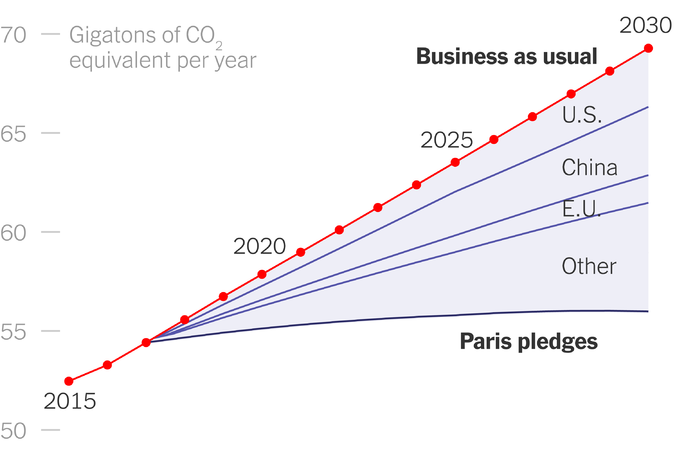The Paris Climate Agreement, adopted in 2015, represents a pivotal moment in global efforts to combat climate change. As nations come together under this framework, the question arises: does the Paris Climate Agreement work? Evaluating its effectiveness necessitates a granular analysis of its design, implementation, and measurable impacts on global emissions and climate action.
To begin, the structure of the Paris Agreement is fundamentally built on voluntary national commitments, known as Nationally Determined Contributions (NDCs). This paradigm contrasts sharply with previous international accords that imposed binding targets. Each country sets its own climate goals, reflecting its unique circumstances, capabilities, and priorities. Such flexibility allows for tailored approaches to emissions reductions. However, it also raises concerns about accountability and ambition. The absence of strict enforcement mechanisms may permit nations to underperform without facing substantial repercussions.
Moreover, one of the agreement’s strengths lies in its global inclusivity. Nearly every country in the world is a party to the agreement, which creates a universal framework for addressing climate change. This wide participation is crucial, as climate change knows no borders; its impacts are felt globally, whether through rising sea levels, extreme weather events, or biodiversity loss. However, this inclusivity brings with it a spectrum of ambition. Developing nations often require financial and technological assistance to meet their NDCs, underscoring the importance of equitable climate finance systems to support such efforts.
Moving beyond the structure, one must assess the actual outcomes thus far. Initial analyses indicate mixed results in the reduction of greenhouse gas emissions. After the agreement’s adoption, several nations experienced short-term spikes in emissions due to economic recoveries, particularly in fossil fuel-dependent economies. Conversely, some countries have made commendable strides in transitioning to renewable energy sources. For instance, nations like Denmark and Sweden have dramatically increased their wind and solar capacity, showcasing pathways toward decarbonization.
Furthermore, the effectiveness of the agreement is often evaluated through its periodic stocktake mechanism, which obliges countries to report on their progress every five years. The first global stocktake is scheduled for 2023, and preliminary reports indicate growing recognition of the need for more stringent targets. This iterative process fosters transparency and peer pressure among nations, encouraging them to enhance their commitments. Nevertheless, the challenge remains: will nations hold themselves accountable? Sustained pressure from civil society and climate activists is essential to maintain momentum and elevate ambition.
Another essential component for gauging the agreement’s success is the role of non-state actors. Cities, states, and businesses have increasingly stepped up to fill the gaps left by national government inaction. A growing number of local governments have embarked on ambitious climate initiatives, forming coalitions that amplify their impact. The emergence of corporate sustainability pledges and commitment toward net-zero emissions represents a welcome development in forging a holistic approach to climate action. Nevertheless, these localized efforts must be paralleled by substantial national and international policies to create a cohesive strategy.
Global finance is an equally significant determinant of whether the Paris Climate Agreement can translate into actionable results. The pledges made by developed countries to mobilize $100 billion annually to assist developing nations have faced scrutiny. Leadership in climate finance is crucial to foster trust and cooperation among nations. Without adequate resources, the developing world may struggle to implement necessary mitigation and adaptation strategies, thus undermining the agreement’s goal of limiting global warming to well below 2 degrees Celsius, ideally 1.5 degrees Celsius.
As the world grapples with increasing climate volatility, emerging scientific evidence continues to underscore the urgency of the situation. Reports from leading climate scientists advocate for immediate and sweeping action to avert catastrophic climate consequences. Consequently, if the Paris Agreement hopes to prove effective, nations must prioritize robust and invasive measures to reduce emissions swiftly. Innovations in carbon capture and storage, reforestation, and sustainable agriculture are critical avenues for exploration. This collective pursuit of technological advancement, coupled with a renewed emphasis on sustainable practices, is vital for the agreement’s long-term efficacy.
It’s also imperative to recognize the evolving landscape of climate policy. Climate denialism and political instability can threaten the treaty’s integrity. A resilient framework must adapt to shifting political tides and ensure that the engagement of all parties remains steadfast. Demands for climate justice are steadily growing, advocating for inclusivity in decision-making and recognition of the disproportionate burdens borne by marginalized communities. Addressing these concerns can bolster public support and ensure a more equitable transition to a low-carbon future.
In conclusion, while the Paris Climate Agreement lays a foundational framework for global climate action, measuring its success requires nuanced and ongoing assessments. Its effectiveness is contingent upon voluntary commitments, transparency, accountability, and the active participation of all sectors of society. As the world collectively confronts the challenges of climate change, the focus on implementing the agreement must transcend mere compliance; it should aim for an ambitious and equitable pathway toward a sustainable future. Sustained vigilance, innovation, collaboration, and above all, unyielding resolve are necessary to ensure that the Paris Climate Agreement serves as more than a symbolic commitment. It must ultimately transform into a vehicle for genuine global climate action.








